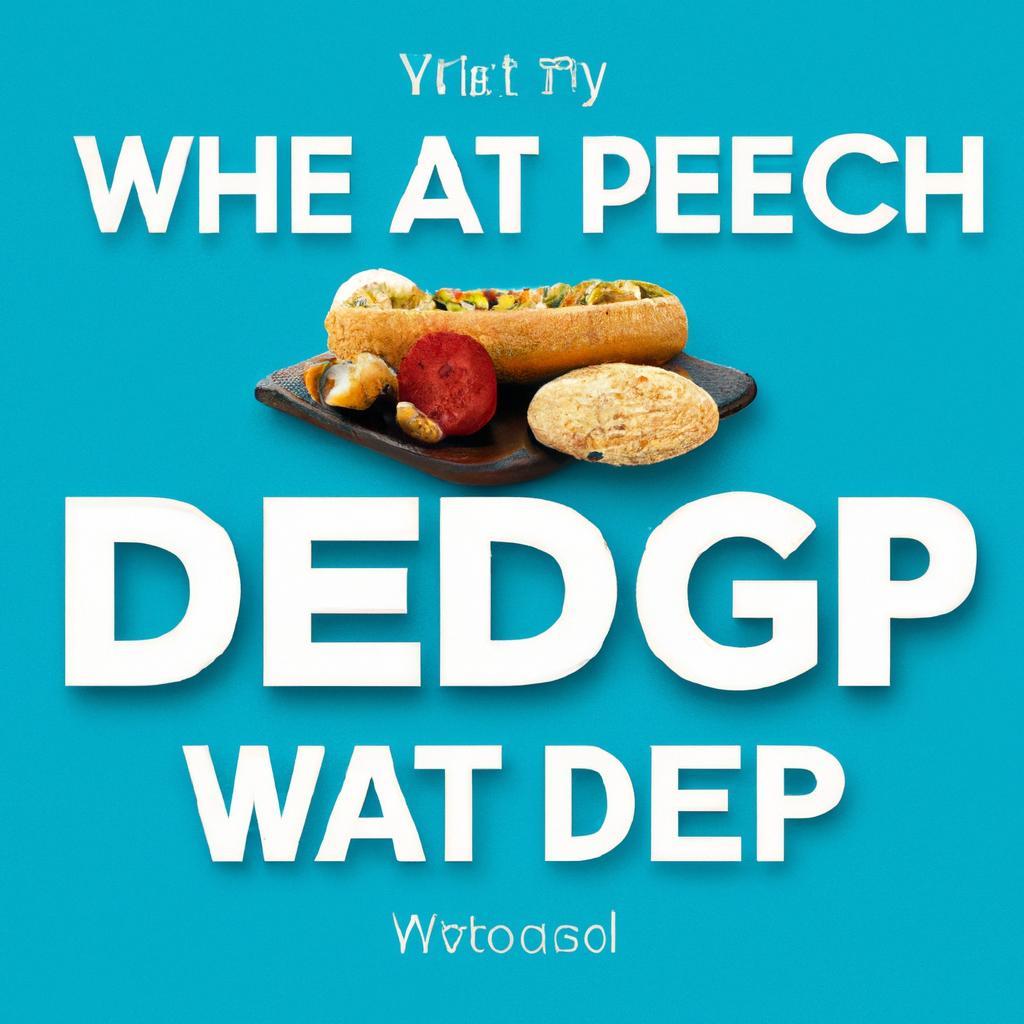Imagine a wagging tail and bright eyes as your dog eagerly awaits mealtime. What if you could serve a meal that not only satisfies their hunger but also promotes their health? The perfect meal for a dog combines high-quality protein, wholesome grains, and fresh vegetables. Think lean chicken, brown rice, and vibrant carrots, all tailored to their specific dietary needs. This balanced meal fuels their energy, supports a shiny coat, and enhances their overall well-being. Give your furry friend the gift of nutrition; they deserve nothing less!
Contents
- Understanding Nutritional Needs for Optimal Canine Health
- Choosing Quality Ingredients for a Balanced Dog Diet
- Tailoring Meals to Your Dogs Age, Size, and Activity Level
- Incorporating Variety and Treats for a Happy, Healthy Dog
- Q&A
Understanding Nutritional Needs for Optimal Canine Health
To ensure your canine companion thrives, it’s essential to understand their unique nutritional requirements. Dogs, much like humans, have specific dietary needs that vary based on factors such as age, breed, size, and activity level. A well-balanced diet is crucial for maintaining their energy levels, supporting their immune system, and promoting overall well-being. By tailoring their meals to meet these needs, you can significantly enhance their quality of life.
When crafting the perfect meal for your dog, consider incorporating a variety of food groups. A balanced diet should include:
- High-quality proteins: Essential for muscle development and repair, proteins can be sourced from lean meats, fish, and eggs.
- Healthy fats: These provide energy and support skin and coat health. Look for sources like fish oil or flaxseed oil.
- Whole grains and vegetables: Carbohydrates are vital for energy, while fiber from vegetables aids digestion. Brown rice, sweet potatoes, and peas are excellent choices.
- Vitamins and minerals: Ensure your dog receives essential nutrients through a variety of fruits and vegetables, or consider a high-quality supplement.
Portion control is another critical aspect of your dog’s diet. Overfeeding can lead to obesity, which poses numerous health risks, including diabetes and joint problems. Consult with your veterinarian to determine the appropriate serving sizes based on your dog’s specific needs. Regularly monitoring their weight and adjusting portions as necessary will help maintain a healthy body condition.
hydration plays a vital role in your dog’s health. Always provide fresh, clean water alongside their meals. Proper hydration aids digestion, nutrient absorption, and overall bodily functions. Additionally, consider incorporating wet food into their diet occasionally, as it can enhance hydration and add variety to their meals. By focusing on these nutritional elements, you can create a meal plan that supports your dog’s health and happiness.
Choosing Quality Ingredients for a Balanced Dog Diet
When it comes to crafting the ideal meal for your canine companion, the foundation lies in selecting high-quality ingredients. Dogs, like humans, thrive on a diet rich in nutrients, and the right components can significantly impact their overall health and well-being. Prioritizing fresh, whole foods over processed options is essential. Look for ingredients that are recognizable and beneficial, ensuring that your dog receives the vitamins and minerals necessary for optimal growth and energy.
**Proteins** are the cornerstone of a balanced dog diet. Opt for lean meats such as chicken, turkey, or fish, which provide essential amino acids that support muscle development and repair. Additionally, consider incorporating plant-based proteins like lentils and chickpeas, which can offer a nutritious alternative. Always ensure that the protein source is of high quality, free from fillers and artificial additives, to promote a healthy digestive system.
Incorporating **healthy fats** is equally important. Fats are a vital energy source and play a crucial role in maintaining healthy skin and a shiny coat. Look for sources such as fish oil, flaxseed oil, or chicken fat. These fats not only provide essential fatty acids but also support cognitive function and overall vitality. Balancing fat content is key; too much can lead to obesity, while too little can result in deficiencies.
don’t overlook the importance of **fruits and vegetables** in your dog’s diet. These ingredients are packed with antioxidants, fiber, and essential vitamins. Carrots, blueberries, and sweet potatoes are excellent choices that can enhance your dog’s immune system and promote digestive health. Always introduce new fruits and vegetables gradually, ensuring they are safe and suitable for canine consumption. By focusing on quality ingredients, you can create a meal that not only satisfies your dog’s palate but also nourishes their body.
Tailoring Meals to Your Dogs Age, Size, and Activity Level
When it comes to crafting the ideal diet for your canine companion, understanding their age, size, and activity level is paramount. Puppies, for instance, have unique nutritional needs that support their rapid growth and development. A diet rich in protein, healthy fats, and essential vitamins is crucial for their energy levels and overall health. Consider formulas specifically designed for puppies that provide the right balance of nutrients to fuel their playful antics and support their developing bodies.
As dogs transition into adulthood, their dietary requirements shift significantly. Adult dogs, depending on their size—small, medium, or large—will benefit from tailored meal plans that cater to their specific needs. Smaller breeds often require higher calorie content in smaller portions, while larger breeds may need a diet that supports joint health and prevents obesity. It’s essential to choose high-quality ingredients that promote lean muscle mass and maintain a healthy weight.
Activity level plays a crucial role in determining the right meal for your dog. Active dogs, such as working breeds or those who enjoy regular exercise, require a diet that provides ample energy. Look for foods that are higher in protein and fat to sustain their stamina. Conversely, less active dogs may need a lower-calorie diet to prevent weight gain. Monitoring your dog’s activity level and adjusting their food accordingly can help maintain optimal health and vitality.
Lastly, always consult with your veterinarian when making significant changes to your dog’s diet. They can provide personalized recommendations based on your dog’s specific health needs and lifestyle. By tailoring meals to your dog’s age, size, and activity level, you can ensure they receive the nutrition necessary for a long, healthy, and happy life. Remember, a well-fed dog is a happy dog, and investing in their nutrition is one of the best decisions you can make as a responsible pet owner.
Incorporating Variety and Treats for a Happy, Healthy Dog
To ensure your dog remains happy and healthy, it’s essential to incorporate a variety of foods and occasional treats into their diet. Dogs, much like humans, thrive on diversity in their meals. A well-rounded diet not only provides essential nutrients but also keeps mealtime exciting. Consider rotating different protein sources such as:
- Chicken – A lean protein that many dogs love.
- Beef – Rich in iron and zinc, perfect for muscle development.
- Fish – Packed with omega-3 fatty acids for a shiny coat.
- Turkey – A great alternative for a low-fat protein option.
In addition to proteins, incorporating a variety of vegetables can enhance your dog’s meal. Vegetables provide essential vitamins and minerals while adding fiber to their diet. Some excellent choices include:
- Carrots – Great for dental health and low in calories.
- Green beans – A crunchy treat that’s high in fiber.
- Sweet potatoes – A nutritious source of carbohydrates and beta-carotene.
- Spinach – Packed with iron and antioxidants.
Don’t forget about the importance of treats! Treats can serve as a fantastic way to bond with your dog and reinforce positive behavior. However, moderation is key. Opt for healthy options such as:
- Homemade treats – Control the ingredients and avoid preservatives.
- Freeze-dried meats – A protein-packed snack that dogs adore.
- Fruits – Small pieces of apple or blueberries can be a refreshing treat.
- Commercially available natural treats – Look for those with minimal ingredients and no artificial additives.
always remember to consult with your veterinarian before making significant changes to your dog’s diet. They can provide tailored advice based on your dog’s specific health needs and lifestyle. By thoughtfully incorporating variety and treats into your dog’s meals, you’ll not only enhance their nutrition but also contribute to their overall happiness and well-being.
Q&A
-
What should be the main components of a perfect dog meal?
The perfect meal for a dog should include:
- High-quality protein: Sources like chicken, beef, or fish.
- Healthy fats: Such as fish oil or flaxseed oil for a shiny coat.
- Carbohydrates: Whole grains like brown rice or sweet potatoes for energy.
- Fruits and vegetables: Carrots, blueberries, and spinach for essential vitamins.
-
How can I ensure my dog’s meal is balanced?
To ensure a balanced meal, consider the following:
- Consult with a veterinarian or a pet nutritionist.
- Use commercially prepared dog food that meets AAFCO standards.
- Incorporate a variety of ingredients to cover all nutritional bases.
-
Are homemade meals suitable for dogs?
Yes, homemade meals can be suitable if they are well-planned. Ensure you:
- Include all essential nutrients.
- Avoid toxic foods like chocolate, grapes, and onions.
- Consult a vet to create a balanced recipe.
-
How often should I feed my dog?
The feeding frequency depends on your dog’s age and size:
- Puppies: 3-4 meals per day.
- Adult dogs: 1-2 meals per day.
- Senior dogs: Adjust based on their health and activity level.
crafting the perfect meal for your dog is essential for their health and happiness. By prioritizing balanced nutrition and quality ingredients, you can ensure your furry friend thrives. Invest in their well-being today for a lifetime of joy together.

大家好,我是彼得潘,專業的手法身體治療師。我喜歡探索和研究各種主題,並透過與人工智慧的合作分享專業、實用、有趣的文章。我們定期進行人工審核,以確保內容的準確性。如果您發現文章中有任何不準確的地方,請隨時與我們聯繫,我們會及時糾正。您可以透過 [email protected] 與我們聯繫。



